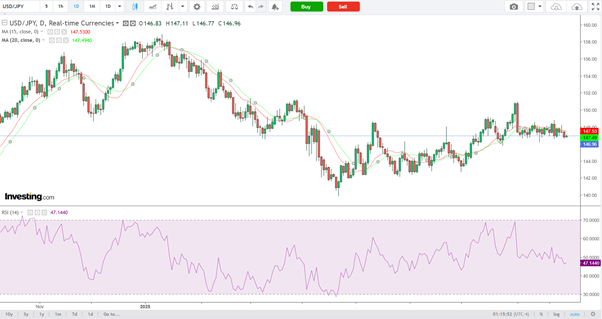Moody’s downgrades Senegal to Caa1 amid rising debt concerns
USD/JPY is currently trading at 146.96, after an intraday high of 147.11 and a low of 146.77. The pair is hovering around its short-term moving averages, with the 15-day moving average at 147.53 and the 20-day moving average at 147.49, both slightly downward-sloping—indicating mild bearish pressure.
The RSI (14) reads 47.14, reflecting neutral momentum, neither oversold nor overbought.
Key Technical Observations
- Moving Average Pressure: Price remains below both the 15-day and 20-day moving averages, hinting at weak upside momentum unless reclaimed quickly.
- Range-Bound Movement: The pair is consolidating between 146.50 support and 148.50 resistance, showing no strong directional breakout.
- Neutral RSI: At 47, the RSI signals balanced momentum, but a drift lower could confirm bearish continuation.
- Volatility Compression: Smaller candles and tightening price action suggest the market is coiling ahead of a larger move.
Macro & Market Context
- Yield Correlation: The pair remains closely tied to U.S. Treasury yields; any dip in yields could drag the US dollar lower.
- BoJ Caution: Uncertainty over BoJ’s policy stance beyond yield-curve tweaks caps upside for the dollar.
- Risk Appetite: Carry trades still support dips in USD/JPY, but risk-off flows could favour yen strength.
Key Levels to Watch
- Immediate Resistance: 148.00 – 148.50 (range top / moving average convergence)
- Next Resistance: 150.00 (psychological barrier, multi-month high zone)
- Immediate Support: 146.50 (range floor)
- Breakdown Support: 145.00 (major psychological level)
Bias: Neutral to Mildly Bearish
As long as the pair trades below 147.50, downside risks remain toward 146.50. A close above 148.50 would shift the bias back to bullish.
Patience may be key in this range. Buying dips near 146.50 with stops just below 145.80 could offer a favourable setup, while momentum traders may prefer to wait for a breakout above 148.50 for confirmation of renewed upside. Chasing price inside the current 146.50–148.50 band risks being caught in sideways chop.

